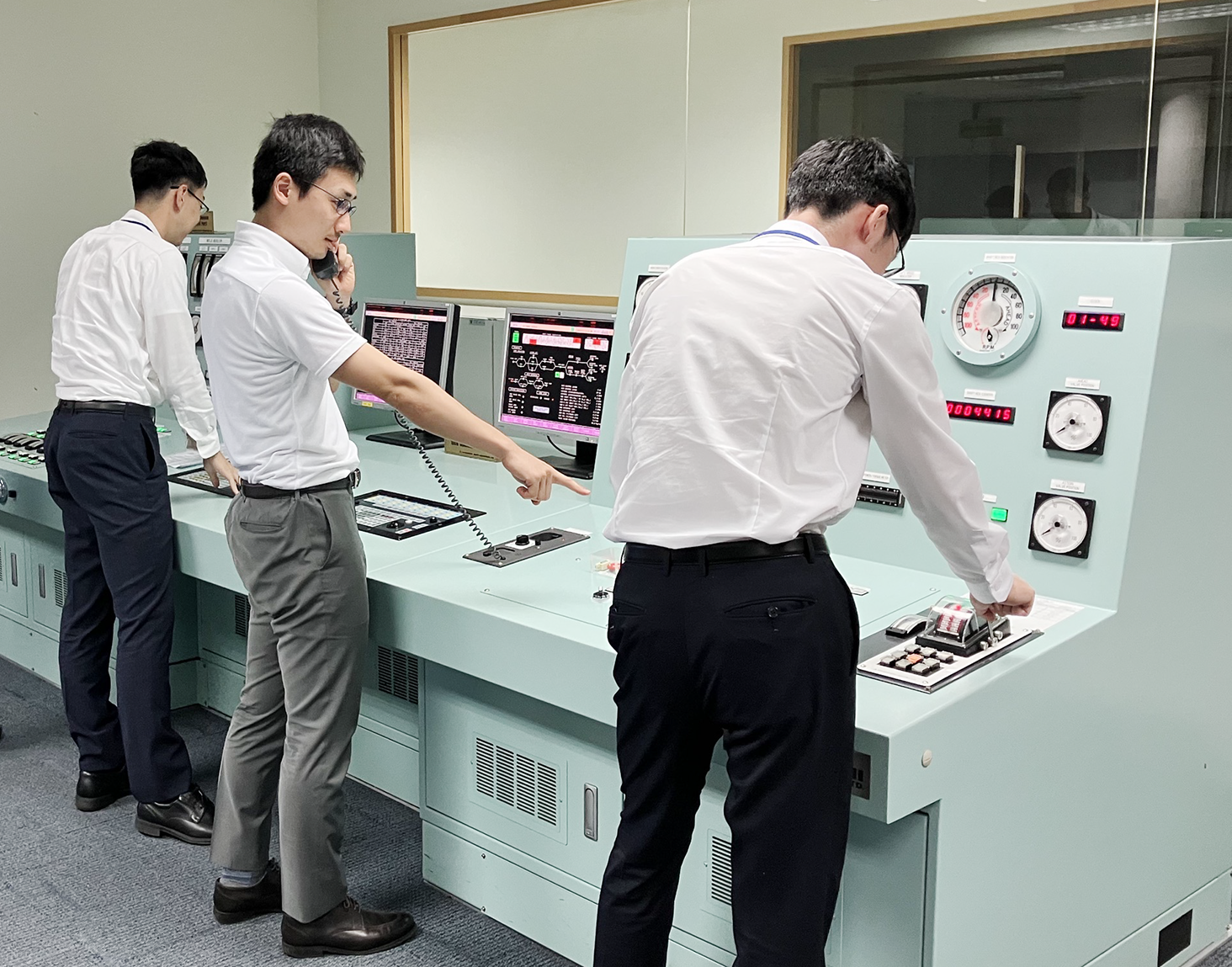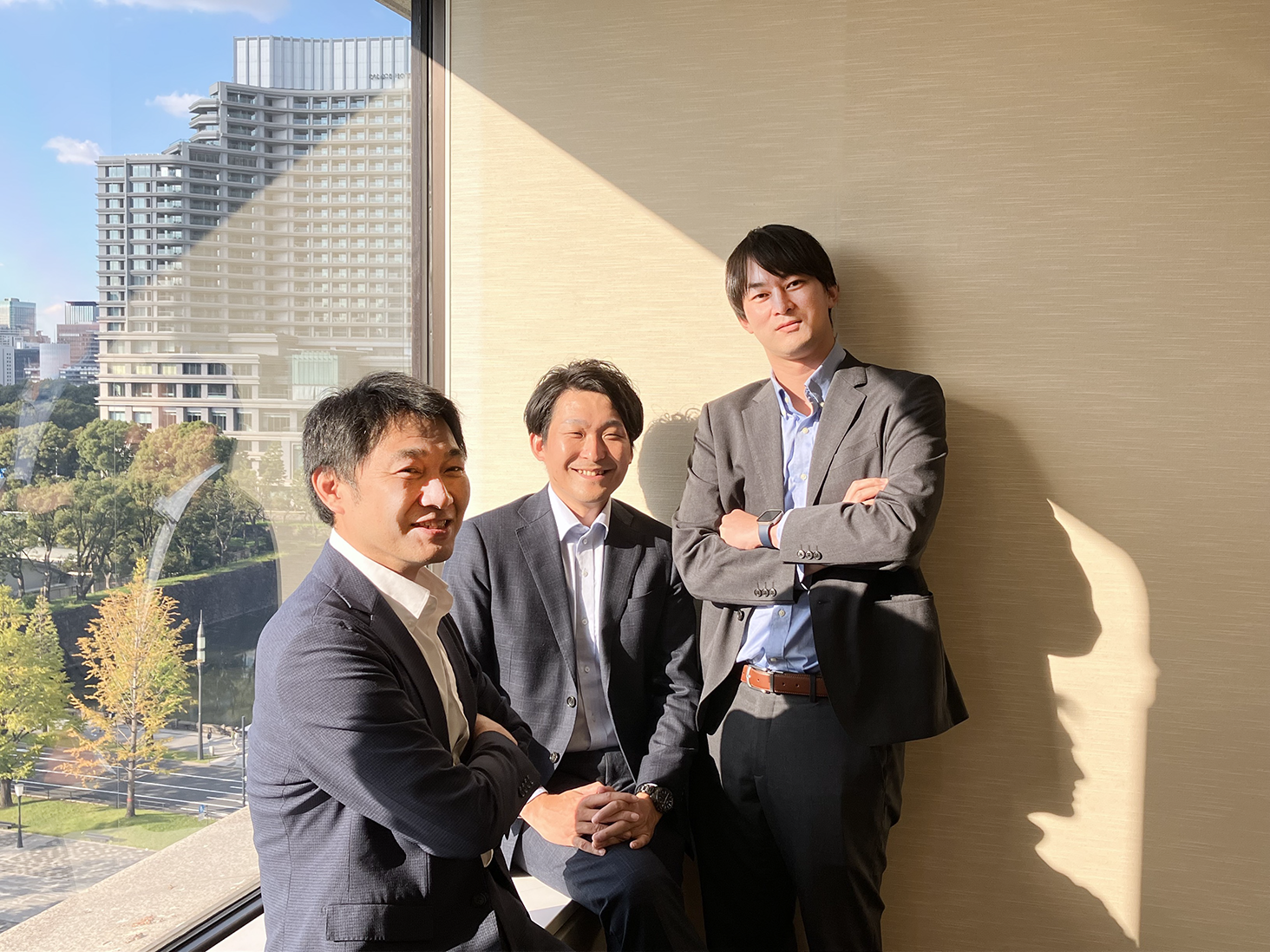Offering Pathways to Becoming a Navigation Officer or Engineer
NYK currently employs approximately 600 Japanese navigation officers and engineers,*1 each of whom plays a key role in supporting the maritime shipping industry. Since the expertise required is high, it takes employees a long time to fulfill their career paths. One important task of the Human Resources Group’s Marine HR Team is to provide navigation officers and engineers with consistent career support that begins when they join the Company. Manager Hideyo Takeshita explains part of the development process.
“To obtain a license as a third officer or third engineer, 12 months of experience working on board ships is needed. In meeting this requirement, several pathways are available.”
Employees recruited from maritime colleges (educational institutions for seafarers) already have six months of onboard experience when they graduate, which is acquired during practical training. Therefore, such employees obtain their licenses by accumulating the remaining six months of onboard experience through practical training after joining NYK. Originally, most new recruits obtained licenses in this manner. However, around 2005—when a new medium-term management plan called for proactive fleet expansion—securing and training crew members for more ships became a major issue. As a result, in 2006 NYK became a pioneer among companies in Japan by establishing an in-house program for training newly recruited general university graduates as navigation officers and engineers. Currently, new hires who utilize this wholly in-house training program are roughly equal in number to hires recruited from maritime colleges and merchant marine technical colleges.

Supporting Employees as They Face Challenges and Monitoring Their Personal Growth
Marine HR Team member Wataru Ishikawa gives an overview of how new employees with non-maritime backgrounds become navigation officers and engineers.
“It takes about two years for employees trained through our in-house training program to become onboard navigation officers and engineers. During this time, employees receive training in specialized fields related to ships as well as practical training onshore and at sea. Their aim is to acquire national certification.”
New hires can become anxious about their current position because gaining a reassuringly concrete sense of how their career will progress is difficult due to the long training period that is required. Further, working on board a ship for several months at a time is completely different from onshore workstyles.
Kohei Takayama, a member of the Marine HR Team, describes the difficulties faced by trainees.
“Trainees spend long periods with more than 20 Japanese and non-Japanese crew members in the physically confined space of a 300-meter-long ship. Such special circumstances always present difficulties in terms of human relations and the ship’s environment. Particularly when employees are inexperienced, being part of this small community often makes them acutely aware of the gap in experience between themselves and senior employees. Consequently, trainees find it difficult to distance themselves physically and psychologically from their circumstances.”
However, Takayama adds that overcoming such challenges is part of the development process.
“I often think that beginning a career as a navigation officer or engineer is like rowing a boat. When you begin rowing, the boat feels very heavy. But, as the speed increases, inertia takes effect, and you move forward with greater ease.”
Ishikawa is in full agreement.
“As well as working in a special environment, trainees are often reprimanded in the early phase of their training because they are not used to their duties. However, senior crew members have also gone through similar experiences. In many cases, the encouragement and support of senior crew members helps trainees gain a sense of accomplishment, even when they have made small mistakes. After disembarking from ships, some young trainees enthusiastically recount such experiences to us.”

Takeshita explains the work of his team.
“All three of us are seafarers and currently work onshore. I think that the unique nature of offshore duties is difficult for most employees to envision if they only previously experienced onshore duties. When assigned to frontline operations, some employees feel a very big gap between offshore and onshore work. We thus spend a lot of time considering ways of closing this gap. In particular, we are focusing on making young trainees aware of the future that lies beyond their hardships.”
NYK established a performance development officer (PDO) system in 2020. Emphasizing dialogue with each navigation officer and engineer, the system is aimed at developing employees in line with their individual aptitudes. To this end, members of the Marine HR Team conduct one-on-one interviews with navigation officers and engineers before embarkation and after disembarkation. Takayama recalls his experience of working offshore.
“Basically, I never visited the Company when I was working offshore. To be honest, I had fewer opportunities to feel that I was a member of NYK than I have now in the course of performing my onshore duties. Nonetheless, even before the introduction of the PDO system, I was often contacted by a member of the Marine HR Team. I think this gave me a sense of belonging to the Company.”
Given his firsthand experience of “development through dialogue,” Takayama feels the establishment of a system that facilitates such dialogue is significant.
Similarly, Ishikawa’s onboard experience gives him insight into the challenges faced by trainees.
“At the outset, everyone has moments when they feel both physically and mentally tired due to the hectic work schedule. However, the knowledge gained through overcoming such difficulties becomes an invaluable asset for navigation officers and engineers. As everyone experiences such hurdles, I hope that trainees find their own way to overcome them and move forward.”

Crewing Ships during the COVID-19 Pandemic
The Marine HR Team is also responsible for the crewing of ships, which entails managing who boards and disembarks and at what time. The word “ship” covers a diverse range of vessels. Operations differ depending on whether the ship is a pure car and truck carrier, an energy carrier, or some other type of ship. For this reason, navigation officers and engineers are very much interested in which type of ship they will be assigned to next. The team also crews NYK-owned ships with new recruits who are to undergo practical training.
Ishikawa recalls that on many occasions crewing ships during the COVID-19 pandemic felt like walking a tightrope.
“At the time, the conditions for replacing crew members were quite strict. Moreover, the rules changed almost every week. For about a year, we somehow managed to replace crew members while remaining abreast of these rule changes. We were under a lot of pressure, but the replacement of crew members was essential to keep ships operating. Therefore, we went about our work with a sense of mission.”
He recalls that training new recruits also presented the team with challenges.
“During the pandemic, there were also many regulations concerning the training of new recruits. So, training on board NYK-owned ships had to be conducted in trying conditions. We took a range of measures in coordination with ship-management companies, schools, and Japan’s Ministry of Land, Infrastructure, Transport and Tourism. Thanks to these measures, our in-house trained employees managed to obtain licenses.”
Despite the hardships of the pandemic, we were able to support the future career development of navigation officers and engineers by constantly thinking about what we could do to help them.
Developing Truly Competent Navigation Officers and Engineers in Anticipation of the Future
Even in an era of rapid change, it is unlikely that the maritime shipping industry in Japan, an island nation, will disappear. However, the nature of the industry will probably change dramatically going forward. Such advances as the introduction of autonomous ships—which are enabled by the latest technologies—and the use of new fuels will require navigation officers and engineers to constantly update their knowledge.
Ishikawa reflects on the approaching new era.
“I believe that the speed of change over the next 10 years will be much greater than that of the previous decade. As navigation officers and engineers will have to continue adapting, the professional competence that they develop by working in frontline operations will be a strength.”
For navigation officers and engineers, what is true professional competence?
Takayama explains his views on this topic.
“Crew members work on ships in ways that organically link the clearly defined roles of each crew member, thereby enabling the entire crew to focus on safe ship operations as their common goal. Taking navigation officers as an example, one of their important duties while the ship is operating is to measure the ship’s position. In days gone by, this duty was subdivided into three roles: using a compass to measure the ship’s heading, recording the heading, and plotting the heading by drawing a line on the chart. Initially, navigation officers would be assigned the easiest role, which is measuring the ship’s heading. When the officers became highly proficient in this role, they would be assigned to the next role and so on. By proceeding through these stages, navigation officers developed a comprehensive understanding of the duties associated with their jobs. Because captains, as the highest-ranking crew members, understand all the duties of navigation officers, they can find the best solution in each situation and continuously spearhead the achievement of safe ship operations even when various unforeseen circumstances occur on board. Today, more tasks can be performed by machines. Nonetheless, for navigation officers and engineers who work on modern ships, communication skills and teamwork are just as important as they have always been.”
Ishikawa gives his definition of professional competence.
“I believe that being a competent navigation officer or engineer means having on-the-job experience and knowledge that enable cargo to be transported as safely and reliably as possible. Navigation officers and engineers are the only personnel who can actually operate ships, which is why we are able to experience everything that happens on board ships at sea.”
When operating ships with limited onboard resources in terms of crew members and physical assets, sudden problems can arise that prevent the ship from proceeding unless they are resolved. In such situations, each navigation officer and engineer must make maximum use of their abilities to deal with the emergency at hand. The experience of teamwork that relies on individual abilities in this way is certain to be useful when adapting to new challenges and incorporating innovative approaches.
In June 2023, NYK’s Human Resources Group called for both the Company and its employees to pursue an optimal human resource profile by “assigning the right person to the right place.”*2 For navigation officers and engineers, this involves the utilization of their professional competence in a variety of duties—not only on board ships but also in onshore duties related to operations, planning, and sales support. What exactly does “assigning the right person to the right place” entail for navigation officers and engineers?
Takeshita explains the concept.
“Navigation officers and engineers will develop work skills that become new strengths. As times change and businesses expand, these personnel will need to establish additional areas of professional competence that are completely different from their traditional fortes. They must acquire a wide range of knowledge, experience, and skills as generalists. The team is in the process of discussing how to establish additional areas of professional competence and what kind of support we can provide for this purpose. We want to discuss and develop our ideas through dialogue.”
The frontline operations of the maritime shipping industry are supported by NYK’s navigation officers and engineers who have honed their skills in the course of performing onboard duties. Accordingly, the Marine HR Team will provide them with long-term support throughout their careers. How will the team utilize the true professional competence of navigation officers and engineers to develop personnel capable of leading the Company as a whole? As they have confronted challenges at sea and continued to realize strong teamwork, the members of the Marine HR Team are sure to create innovative plans and chart a new course for the Company.

(Interview October 24, 2023)
- *1 Navigation officers and engineers
These are employees who hold national licenses as navigation officers or as engineers. Navigation officers safely handle ships. Engineers are experts in onboard machinery. Based on this expertise, they are engaged in both offshore and onshore operations. - *2 Assigning the right person to the right place
This refers to the type of career path advocated by NYK. Through job rotations, employees improve work skills so that they become areas of professional competence underpinning employees’ careers.





